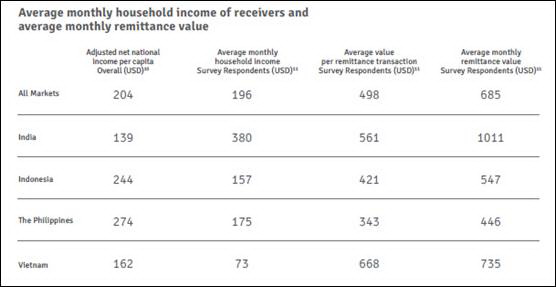The monthly inward remittances by low-income earners average 10 times their recipients’ incomes, according to a new report by US payments company UniTeller.

The monthly inward remittances by low-income earners average 10 times their recipients’ incomes, according to a new report by US payments company UniTeller.
“Both Sides of the Coin: The Receiver’s Story” said the average remittance is US$735 while those who receive it have an average monthly household income of $73.
More than a fifth of the latter regularly ran out of money before they got their next monthly remittance because of poor financial planning and spending on non-essential luxury items.
Almost half of all remittances were used for day-to-day family needs (24 per cent) and bill and loan repayments (25 per cent).
Much smaller sums were apportioned to areas that could further economic progress, like education (11 per cent) and savings (14 per cent).
Relatively high amounts were spent on non-essential luxury items (9 per cent).
Alberto Guerra, CEO of UniTeller, said: “With global mobility increasing, remittances are playing a more important role in the livelihoods of low-income families and communities.
“As the reliance on remittances grows, a key challenge is ensuring this income translates to building sustainable wealth.”
Thirty five per cent of recipients said they would reach out to their main sender when they run out of the money they receive while the rest ask family and friends.
But 37 per cent said they would ultimately have to forgo day-to-day needs if this happens.
The survey found that a reliance on remittances also placed increasing stress on the relationship between senders and receivers.
Two in five (43 per cent) reported that the expectation of receiving remittances placed emotional stress on their family and 31 per cent said it impacted their relationship with the sender.
Though the report highlighted that receivers did not allocate enough of the remittances to savings, it said there were untapped opportunities to increase the capacity to build sustainable wealth, with 59 per cent of regular recipients saying they were extremely eager to learn and cultivate good financial habits.
The report was the first instalment of UniTeller’s research into the behaviours and attitudes of low-income remittance recipients in the Philippines, India, Indonesia, and Viet Nam regularly receiving money from senders in Hong Kong, Singapore and the US.
It was based on a survey of 1,911 adults from low-income households, 301 in Viet Nam.
Viet Nam is expected to remain the ninth largest remittance receiver in the world with an estimated inflow of $16.7 billion in 2019, according to the World Bank. — VNS





